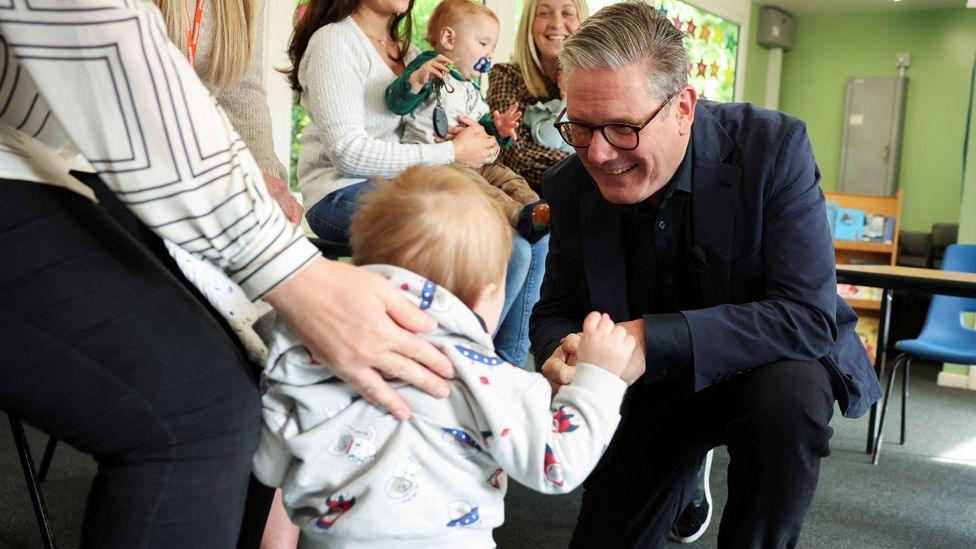Labour pledges 100,000 new childcare places

Labour leader Keir Starmer spoke to parents in Nuneaton about the policy
- Published
The Labour party has pledged to create 100,000 additional childcare places and more than 3,000 new nurseries as part of its childcare plan.
Labour has said it will turn classrooms in existing primary schools into "school-based nurseries", for an estimated cost of around £40,000 per classroom.
The money would come from VAT levied on private schools - a move which has been previously criticised in the sector and by other parties.
Labour leader Sir Keir Starmer said, if elected, his party would "create the childcare places needed to turn the page, and rebuild Britain”.
The number of state primary and nursery pupils in England is predicted to fall, external by 8.8% (397,000) over the next five years.
Labour says it will use the space freed up in primary school buildings for the 3,334 new "high quality" nurseries, which would be set up in high-need areas which lack enough childcare places.
They could be run by the primary schools themselves, or by local private and voluntary sector nursery providers.
'Class war'
The funding will come from Labour's plan to remove what it has called "unfair tax breaks" from private schools.
In a TV debate between the two party leaders last week, Prime Minister Rishi Sunak said he disagreed with Labour's plans to remove the tax breaks and charge private schools 20% value added tax (VAT).
"People who work hard and aspire to provide that education for their kids should have that freedom," he said.
The prime minister has previously said the policy was part of a "class war" to "punish" aspirational parents.
On Sunday, Labour's shadow attorney general Emily Thornberry told GB News the policy could increase class sizes in state schools in the short term.
But her colleague, the party's shadow education secretary Bridget Phillipson, told the BBC's Today programme on Monday that "wasn't right" and that there had been a "misunderstanding".
And Mr Starmer said the impact on class sizes would be "negligible".
Labour said its announcement is the next stage in its long-term plan to deliver a modern childcare system that better supports parents from the end of parental leave to the end of primary school.
Speaking on a visit to Nursery Hill Primary School, Nuneaton, Warks, Mr Starmer said developing "wraparound" nursery care in primary schools would be a "game-changer" for working parents with older children in the school.
Ms Phillipson said the party will "fix" the childcare system.
“The 3,300 new nurseries we announce today will be key to delivering Labour’s mission for half a million more children to hit the early learning goals by 2030, giving them the firm foundations from which to succeed", she added.
Labour had previously announced plans to set up free breakfast clubs in every primary school in England.
The party had also committed to stick to government plans for an expansion of funded childcare earlier this year, which saw working parents receive additional free childcare hours from April 2024.
The Department for Education has previously said about 85,000 extra childminder and nursery places are needed in England for the expansion to work.
During a visit to Stafford College, Education Secretary Gillian Keegan said the Conservative party had "done more on childcare than any other government, ever".
She said most of the nursery places for England were already delivered at schools, "so that's already being provided".
She accused Labour of "re-announcing things that we've already done".
"We've already announced the policy, we've already started delivering it... and it's already successfully being rolled out," she said.
A spokesperson from the Liberal Democrats told BBC News that "flexible, affordable childcare is critical for giving parents more choice over how to organise their lives, helping them return to work if they want to, and tackling the gender pay gap".
"But affordable childcare is only part of the picture", they added.
The spokesperson said that the Liberal Democrats will also set out plans to "transform" parental leave.

Gender equality charity the Fawcett Society welcomed Labour's plan, and said it was "about time childcare became an election priority".
"We need to see childcare given the prominence it deserves in every party’s manifesto and we need to see genuine, long-term commitments that last beyond this election," the charity added.
The charity said 85% of mothers struggle to find childcare that fits around their jobs, leading many to stop working.
Sarah Ronan, director of the Early Education and Childcare Coalition, said: “Labour’s commitment to increasing the number of places is the right one, however if you boost places you have to also boost staff numbers, so underpinning its plan for reform must be a new workforce strategy that will attract more people into the sector and see early years professionals receive the pay, conditions and respect they deserve.”
The charity Pregnant Then Screwed welcomed the "first stage plan" to reform the sector.
"There is little point in reducing the cost of childcare for parents if they cannot access a place, and with long waiting lists, and childcare deserts across England, it is imperative we do not continue to paper over the cracks," its founder, Joeli Brearley, said.

Sign up for our Election Essential newsletter to read top political analysis, gain insight from across the UK and stay up to speed with the big moments in the general election campaign. It’ll be delivered straight to your inbox every weekday.